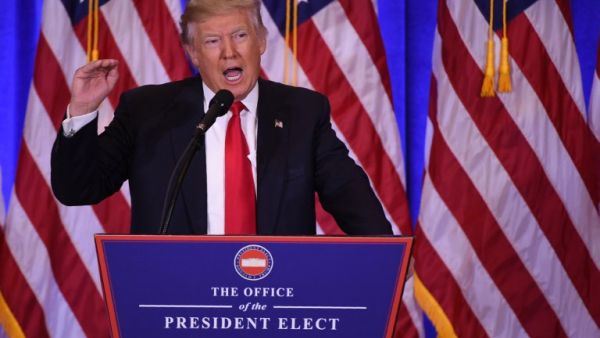As Donald Trump was sworn in as America’s 45th President on Friday, the businessman turned politician used his inauguration speech to launch an unflinching attack on the US political establishment. The populist figure may well have promised to transfer power from Washington to the American people, but what of people living thousands of miles away, in the Middle East?
At first glance, this unorthodox, trailblazing Trump who says it as it is might be just what the Arab doctor ordered. Why, the Middle East has been itching for years for such a rule-breaker! Someone who sticks it to the history books and challenges that great American tradition of keeping one particular part of the Middle East in political stalemate.
On Israel/Palestine, the US stance has been as consistent as the conflict it fuels. Administration after administration has used its veto power to frustrate international resolutions calling out Israel for its illegal behavior. Outgoing President Obama may have taken the historic stand to abstain on a UN resolution about Israel, but he did so only 28 days before he left office. A half-hearted lunge at Israeli Prime Minister Benjamin Netanyahu as he headed for the door, the move did little to redirect the one-directional torrent that is American policy on Israel.
From the Middle East's perspective, the US government whether Democrat or Republican from Truman to Kennedy, Nixon to Reagan, Carter to Clinton has been one and the same as far as the question of Israel was concerned.
JFK was the first President to speak of America’s “special commitment” to Israel but other presidents were no less aware of this exception to all other foreign policy rules. However much they may have tried not to toe the line, successive leaders were unable to overcome the Israel lobby, a central part of that establishment upon which Trump has apparently declared war. Meanwhile, across decades Palestinians suffered from a brutal ongoing occupation, the attempted erasure of their communities and inadequate, unjust international agreements.
So, to use an Americanism, a break with routine would be awesome for the Middle East, if that meant rejecting the convention of supporting Israel. But with Trump it clearly doesn't.
Despite his rebellious tone, Trump is unlikely to move away from the unquestioning support of Israel shown by his predecessors. We know this because Trump, prior even to taking power, had pledged to take the highly inflammatory step to move the US embassy from Tel Aviv to Jerusalem. We know this because he has appointed a hardline Zionist and active supporter of West Bank settlement activity as ambassador to Israel. And we know this because Netanyahu’s Israel can barely contain its joy over the new American President, declaring him a “true friend to Israel”.
To Arab ears, the new President’s nonconformist speech sounded so promising. Yet, when Trump criticizes American subsidization of foreign armies, we can assume he has no plans to cancel the $38 billion in military aid to Israel agreed by his predecessor. And when he speaks in almost protectionist terms of putting “America First”, ironically using a phrase with historical anti-semitic connotations, there is little indication that this will translate into America actually minding its own business.
Because, after all, that is the change the Middle East really hopes for. An end to American interference to free the way for the international community’s increasing tide of pro-Palestinian support to usher in a fair and just peace deal that might just result in a real transformation of the status quo.







